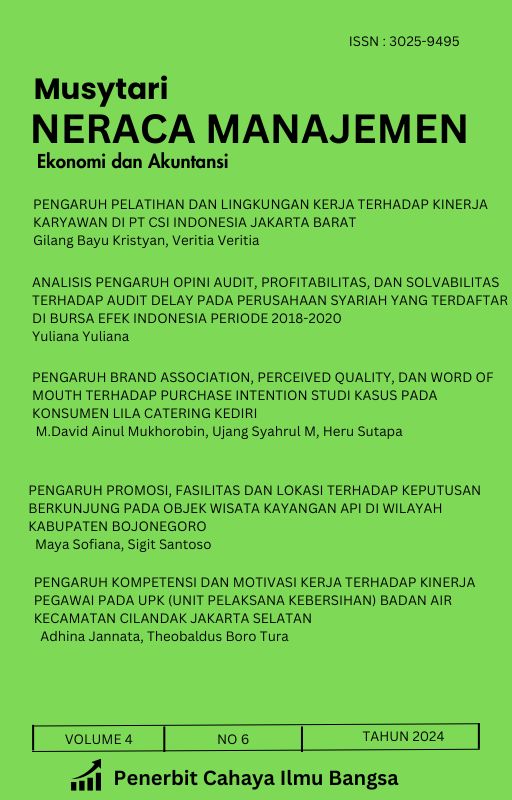ANALISIS REAKSI PASAR MODAL ATAS HARI RAYA IDUL FITRI (EVENT STUDY PADA PERUSAHAAN CONSUMER GOODS INDUSTRY)
Published 2025-06-27
Keywords
- Market Reaction, Abnormal Return, Trading Volume Activity, Eid al-Fitr, Event Study
How to Cite
Abstract
This study aims to analyze the capital market's reaction to the Eid al-Fitr holiday using an event study approach in the consumer goods sector listed on the Indonesia Stock Exchange (IDX) during the period of 2021–2024. Market reaction is measured using two main indicators: abnormal return and trading volume activity (TVA), with an observation period of five days before and five days after the Eid holiday. The analytical method used is the independent sample t-test to examine differences between the event and non-event periods.
The results show that the market reacted significantly in the form of abnormal returns before and after the Eid holiday. Prior to the holiday, abnormal returns were negative and significant, indicating selling pressure from investors. After the holiday, a significant positive abnormal return was observed, followed by a significant decline, indicating post-holiday optimism and profit-taking. Meanwhile, trading volume activity did not show any significant difference across both periods, indicating stable trading activity. These findings support the hypothesis that the Indonesian capital market reacts to the Eid al-Fitr holiday, particularly through price movements, although it is not fully semi-strong efficient.
References
- [1] Agustine Sulviani, & Enok Nurbayasari. (2020). ANALISIS PERBEDAAN ABNORMAL RETURN SEBELUM DAN SESUDAH LIBUR IDUL FITRI SERTA LIBUR TAHUN BARU (Studi Empiris Pada Perusahaan Indeks LQ45 Bursa Efek Indonesia Periode 2015-2018). J-Aksi : Jurnal Akuntansi Dan Sistem Informasi, 1(1), 1–11. https://doi.org/10.31949/j-aksi.v1i1.169
- [2] Ahmad Taslim, A. W. (2016). Pengaruh Frekuensi Perdagangan Saham, Volume Perdagangan Saham, Kapitalisasi Pasar Dan Jumlah Hari Perdagangan Terhadap Return Saham. Management Analysis Journal, 5(1), 1–6.
- [3] Apriani, S. S., & Komariah, S. (2022). Holiday effect di Bursa Efek Indonesia, di Bursa Efek Amerika dan di Bursa Efek Jepang sebelum, sesaat dan sesudah pandemi covid-19. Fair Value: Jurnal Ilmiah Akuntansi Dan Keuangan, 5(5), 2339–2352. https://doi.org/10.32670/fairvalue.v5i5.2702
- [4] Baker, M., & Wurgler, J. (2007). Investor sentiment in the stock market. Journal of Economic Perspectives, 21(2), 129–151. https://doi.org/10.1257/jep.21.2.129
- [5] Budiman, J., Quinn, F., W, A. J., L, H. W., & Bisnis dan Manajemen, F. (2022). YUME : Journal of Management Perilaku Bias Investor Kota Batam dalam Berinvestasi Saham. YUME : Journal of Management, 5(2), 533–542.
- [6] Esra, M. A. (2018). Analisis Perbedaan Return Saham Dan Volume Perdagangan Saham Sebelum Dan Sesudah Holiday Effect Pada Perusahaan Indeks Lq-45 Periode 2012-2016. Jurnal Ekonomi Perusahaan, 24(2), 177–185. https://doi.org/10.46806/jep.v24i2.444
- [7] Fama, E. F. (1970). Efficient Capital Markets: A Review of Theory and Empirical Work. The Journal of Finance, 383–417. https://doi.org/https://doi.org/10.2307/2325486
- [8] Firlianti, A., & Mildawati, T. (2021). Analisis Perbandingan Holiday Effect Terhadap Return Dan Volume Perdagangan Saham Pada Pasar Saham Di Bursa Efek Indonesia. Jurnal Ilmu Dan Riset Akutansi, 10(6), 1–20.
- [9] Fleming, G., Liu, Z. F., & Merrett, D. (2024). Are investors attentive before a one-off holiday? Journal of Accounting Literature. https://doi.org/10.1108/JAL-08-2024-0219
- [10] HARTINI, T., AMIR, A., JUNAIDI, J., & LUBIS, T. A. (2019). the Difference Analysis of Abnormal Return and Trade Volume Activity Before and After Ramadhan Effects on Food and Beverages Companies Listed in Indonesian Sharia Stock Index (Issi). Journal of Business Studies and Mangement Review, 2(2), 88–93. https://doi.org/10.22437/jb.v2i2.7221
- [11]
- [12] Hidayati, N., Maslichah, & Junaidi. (2017). REAKSI ABNORMAL RETURN DAN TRADING VOLUME ACTIVITY TERHADAP RAMADHAN EFFECT (Studi pada Perusahaan Food and Beverages yang Terdaftar di Bursa Efek Indonesia Periode 2015-2017). Jurnal Ilmiah Riset Akuntansi, 13(3), 1576–1580.
- [13] Hinawati, T. (2016). Efek Hari Libur Idul Fitri Terhadap Abnormal Return Saham Di Bursa Efek Indonesia. Cakrawala: Jurnal Studi Islam, 10(1), 34–50. https://doi.org/10.31603/cakrawala.v11i1.99
- [14] Kamoune, A., & Ibenrissoul, N. (2022). Traditional versus Behavioral Finance Theory. International Jour-nal of Accounting. Finance, Auditing, Management and Economics, 3(2–1), 282–294. https://hal.archives-ouvertes.fr/hal-03634756
- [15] Khairani, M. U., & Adib, N. (2023). Perbandingan Abnormal Return Saham Antara Libur Idul Fitri dan Libur Nataru (Natal dan tahun Baru). REVIU AKUNTANSI, KEUANGAN, DAN SISTEM INFORMASI, 2(3), 763–771.
- [16] Maulana, A. I., & Suryandani, W. (2024). Comparative Analysis of Stock Returns , Abnormal Return and Tranding Volume Activity for Christmas Event in 2022 LQ 45 Company on The Indonesian Stock Change. 8(2), 151–158.
- [17] Nanda, G. R. W., & Wirakusuma, M. G. (2020). Reaksi Pasar Atas Momentum Hari Raya Idul Fitri Tahun 2019. E-Jurnal Akuntansi, 30(5), 1247. https://doi.org/10.24843/eja.2020.v30.i05.p14
- [18] Oktavia, A. E. (2024). Analisis Pengaruh Libur Idul Fitri Dan Libur Tahun Baru Terhadap Abnormal Return Saham (Studi Empiris Pada Perusahaan Indeks Lq45 Yang Terdaftar Di Bursa Efek Indonesia Periode 2016-2022). Jurnal Studi Manajemen Bisnis, 3(2), 32–48. https://doi.org/10.24176/jsmb.v3i2.11267
- [19] Pribadi, F., & Abilawa, A. (2022). Analysis of the Eid Al-Fitr Holiday Anomaly on Abnormal Return and Trading Volume Activity: Case Study of Jakarta Islamic Index During 2017-2020. Journal of Accounting and Investment, 23(1), 114–127. https://doi.org/10.18196/jai.v23i1.12894
- [20] Rahmawati, N. R., Rinofah, R., & Mujino. (2020). Analisis Pengaruh Hari Libur Idul Fitri Terhadap Return Saham dan Volume Perdagangan Saham Pada Sektor Food and Beverage di Bursa Efek Indonesia Tahun 2016-2018. Jurnal Ekobis Dewantara, 3(2), 28–34. https://doi.org/10.26460/ed_en.v3i2.1483
- [21] Sari, H. R., & Kurniawati, S. B. (2024). Analysis Of Financial Performance Of Consumer Goods Industry Sector Companies Listed On The Idx In 2020-2022. Jurnal Mirai Management, 9(2), 155. https://doi.org/10.37531/mirai.v9i2.7222
- [22] Shefrin, H. (2002). Beyond Greed and Fear. Beyond Greed and Fear, October 2002. https://doi.org/10.1093/0195161211.001.0001
- [23] Subekti, S. E., & Rahmawati, I. Y. (2020). Reaksi Pasar Modal Dari Dampak Peristiwa Hari Besar Agama Islam Terhadap Abnormal Return Dan Trading Volume Activity Saham Perusahaan Indeks Jii Yang Terdaftar Di Bursa Efek Indonesia. Jurnal Manajemen Universitas Bung Hatta, 15(1), 59–69. https://doi.org/10.37301/jmubh.v15i1.17122
- [24] Wahyu Pujiadi, B., & Indriani, A. (2017). Analisis Pengaruh Hari Libur Islam Terhadap Abnormal Return Saham. Diponegoro Journal of Management, 6(2010), 1–12. http://ejournal-s1.undip.ac.id/index.php/dbr

